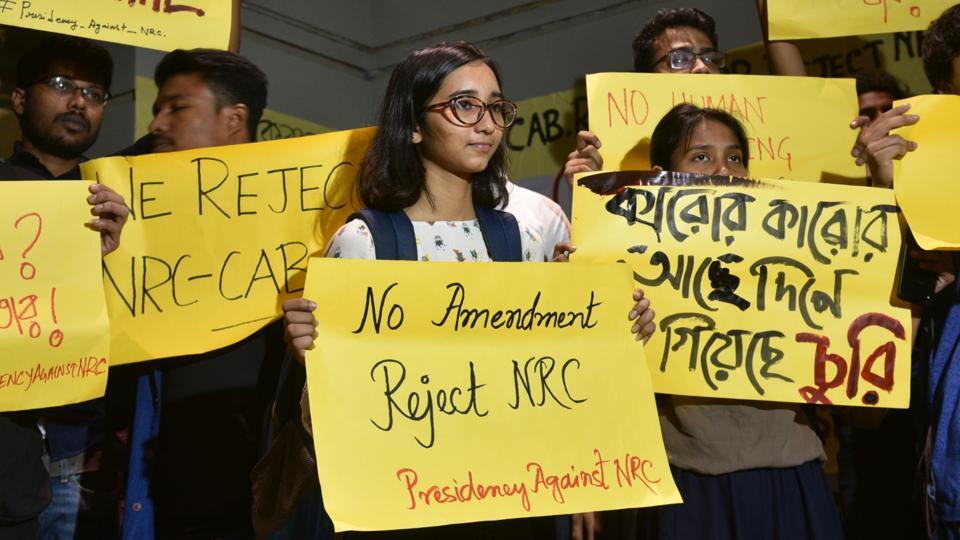Ujjwal K. Chowdhury
The Citizenship Amendment Bill has passed in the Lok Sabha, after a marathon discussion on 9 December. This proposal was a part of the manifesto of BJP in the last 2019 general elections.
What does it basically entail?
The Bill provides for persecuted minorities professing to be Hindu, Christian, Sikh, Buddhist, Jain and Parsi, from three neighbouring nations, Pakistan, Afghanistan and Bangladesh and who have been staying in India since December 31, 2014 or earlier to apply for Indian citizenship. India, under this law, shall accord them the status of citizens. The Bill clearly excludes Muslims, noting that they are the majority in these three nations.
Several questions have been raised on these proposals, and rightly so.
If this law is about trying to be large-hearted and compassionate, then why leave out persecuted Muslims in India’s neighbouring nations, such as the Rohingya of Burma or the Ahmadiya and Baluch people in Pakistan? Why should India leave out Sri Lanka’s persecuted Tamil population? Or the discriminated-against madheshis of Nepal? What about the Gorkhas, who have shifted from Nepal to India, or have worked in India for long?
Next, why is religion the basis of determining whether someone is persecuted, when there can be a variety of other sources of ill-treatment and oppression? There can be persecution on the basis of belief; for instance, the writer Taslima Nasreen had to leave Bangladesh; or due to war as seen in Syria, due to economic hardship, as were many marginalised Nepalese and Bangladeshis who once migrated to India, and due to political belief, as happened with the Dalai Lama and his followers. Even extremes of climate can, and does, trigger migration.
Article 14 of India’s Constitution states that the state “shall not deny to any person equality before the law or the equal protection of the laws within the territory of India” and Article 15 prohibits “discrimination on grounds of religion, race, caste, sex or place of birth”. Article 14 says “persons” rather than “citizens”, which is significant for it means that Indian nationals and foreigners in India have alike rights to equal treatment. Therefore, the provision of citizenship on grounds of religion, as in the new Bill, violates the spirit of the Indian Constitution.
The Supreme Court has held in a case dealing with applicability of Article 14, Chiranjit Lal Chowdhury vs Union of India, that the law would not fall afoul of the equality principle when it deals in a similar way with “all of a certain class”, but such a classification should never be arbitrary.
Arguably, CAB has made an arbitrary classification based on religion, because some Muslim sects also face serious threat and maltreatment in Pakistan, Afghanistan and Bangladesh, arising from their faith. Similarly, Tamils in Sri Lanka have been a persecuted minority—but India’s Bill excludes the country.
CAB is not the first time that India has extended protection to minorities from neighbouring countries. In 2015, the Centre issued two notifications in the Official Gazette under the Passport (Entry into India) Act, 1920 and the Foreigners Act of 1946. Through these, India allowed Hindu, Sikh, Buddhist, Jain, Parsi and Christian immigrants from Pakistan and Bangladesh to enter India even without valid documents.
Importantly, these notifications permitted them to enter and stay in India without valid documents, though it did not grant citizenship.
A significant official document dealing with refugees/illegal immigrants was the Assam Accord of 1985. According to the central government, the National Register of Citizens (NRC) gives effect to that Accord, which the Centre, the Assam government, the All Assam Students Union (AASU) and All-Assam Gana Sangram Parishad (AAGSP) had signed.
In the Accord, it was settled that immigrants who came to Assam before 1 January 1966 would be given citizenship. Those who entered Assam between 1 January 1966 and 24 March 1971 would be “detected in accordance with the provisions of the Foreigners Act, 1946 and the Foreigners (Tribunals) Order 1964.” Thereafter, they would remain disenfranchised for ten years. Lastly, those who came to Assam after 24 March 1971, would be detected and expelled.
The connection between NRC in Assam and CAB
The CAB has to be viewed along with the NRC, which, in Assam, has already excluded 19 lakh people, of whom 13 lakh are Hindu. This is now being touted by Union Home Minister Amit Shah as a template to be applied across India. To be considered citizens, NRC calls for documents as old as seven decades, and proof that a person, and their three generations, have been living in India.
The BJP was initially very enthusiastic about the NRC, but now it is in a Catch 22 situation, since a large number of Hindus, mainly Bengali-speaking people, have been excluded in Assam. Hence, CAB is being brought in to allow the left out non-Muslims to apply for citizenship.
But the 13 lakh excluded Hindus have already claimed that they are Indians, and they have submitted documents to prove their claims, which were rejected. How would these people now move to a different claim, that they are not Indian but Bangladeshi—and persecuted ones at that—and seek Indian citizenship?
How legally tenable is this sort of somersault?
If we deny citizenship even to those who were born in India and own valid Aadhaar cards, PAN cards, voter cards and in many cases passports of India—as happened to many in Assam—millions of Indian-origin citizens or migrants in the United States, United Kingdom, South Africa, Australia, New Zealand, Canada and other nations may be denied citizenship as India is denying citizenship based on religious considerations despite these documents.
These two laws together, NRC and CAB, if applied nationally, will serve to make India an international pariah.
More questions
Why has an arbitrary cut-off date of 31 December 2014 been picked? Why exclude any persecuted person who has shifted to India from a neighbouring nation anytime in the recent past? Why certain states of Northeast are being left out of its purview? The fear of people coming from elsewhere and swamping Northeastern states is looking real in Tripura; where the indigenous Tripuri tribal population is 12 lakh, while the Bengali migrant population is at 28 lakh.
The Intelligence Bureau has noted that only 31,313 non-Muslims have so far applied for long-term visas under the Gazette notification of 2015, which makes this brouhaha about persecuted non-Muslim immigrants a minor issue in reality. The IB also notes that in order to apply for Indian citizenship, one has to provide the reasons for persecution at the point of entry. However, the deadline of 31 December 2014 under the CAB is long gone: those who had to enter India on that date have already done so. Then why push for such a major change in the law which violates the Constitution?
Further, it is not clear that what happens to all those people (now predominantly Muslims) who are kept out of citizenship or identified as foreigners, in Assam or elsewhere. Are they to be pushed into the three neighbouring nations? No country will accept this and Prime Minister Narendra Modi has assured Bangladesh Prime Minister Sheikh Hasina that India would not resort to such tactics. What then—are people to be segregated from the rest of society and kept in detention camps?
Already, many such camps are under construction in Assam and some are in squalid conditions.
India is creating concentration camps through these detention camps. Detained persons will be pulled out of their economically-productive engagement with society and dumped in prison-like camps that are being constructed, and will be run, by the Indian state. Each detenu will be fed and monitored by the Indian state, at tax-payers’ expense. The state and the people of India will pour money into these camps, simply waiting for the detainees to die. With their departure from the labour market, costs will go up and the economy will suffer.
Does any of this sound like a 21st-century prescription to a vexed demographic issue?
Deliberate division
Like the Ayodhya issue, that lasted a quarter-century, NRC–CAB will divide Hindus and Muslims. They will keep the nation engaged in endless debate and action; in which each individual will have to prove his citizenship. This can lead to Hindu polarisation, which brings in electoral benefits to the ruling BJP. This is the foremost reason why NRC and CAB are being upheld.
Second, the debate on religion-based citizenship helps take attention away from the flailing economy, rising joblessness, growing farm distress, falling value of rupee, and deliberate dismantling of the fundamentals of the Indian economy, which is now growing at the slowest pace in South and Southeast Asia.
(The author is the Pro Vice Chancellor of Kolkata based Adamas University.)




